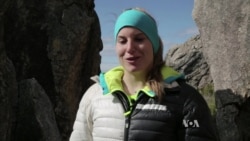About a three-hour drive north of Cape Town, South Africa, there is a region called the Cederberg Wilderness Area that is known mostly for its production of rooibos tea. But over the last 10 years, it has also gained attention for another economy-boosting activity: rock climbing.
Cederberg is now considered one of the world's top 10 destinations for a form of rock climbing known as bouldering, which is performed relatively close to the ground, without ropes and with mattresses to cushion falls.
An area north of the Cederberg mountain range, aptly named Rocklands, is made up of thousands of boulders and rocks spanning more than 20 square kilometers. Petra Klingler of Switzerland, a professional boulderer who just won a world championship, is currently visiting the area for about a month.
"You have everything here — steep, flat, and for the grades you have boulders from easy to really hard boulders. Also what's really nice is that from the whole world, [people] come here and meet, and exchange boulders problems, solutions for boulder problems," said Klingler.
Hundreds of climbers from around the world come to Rocklands every year. Many stay at nearby farms, which open campsites, cabins and stalls. Most climbers stay between one and three months.
Matthys Kruger bought his farm 10 years ago as a weekend destination for his family. But after visitors began asking if they could climb the boulders on his property, he turned his guest farm into a place to accommodate the climbers and now lives here full time.
"When we bought the farm, the main activities around the valley were subsistence farming and small-scale vegetable farming. And that absolutely, totally, 100 percent changed. Where we are at the moment in this valley, every single farm in this valley is tourism, and it's climbing-driven tourism," said Kruger.
Kruger estimates that climbers bring about $1 million to the local economy every year.
About 20 kilometers down the valley, the sleepy town of Clanwilliam is also feeling the impact of the climbers, who come to buy permits to climb in the nature reserve.
"I think our businesses really benefited from it, specifically the supermarkets where they buy the food," as well as restaurants, said Clanwilliam tourism official Esther Steens.
More than 700 climbers came to the area last year. Kruger says the number is increasing by 20 percent a year, and he expects the growth to continue.






